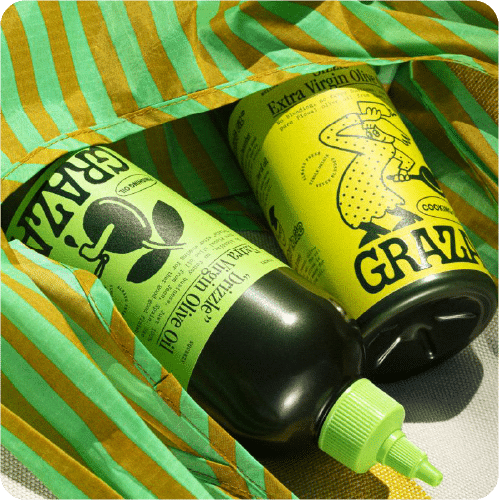
A Conversation with the Co-founder + COO, Graza

Navigating the intricate landscape of supply chain management, Allen Dushi, co-founder of Graza, shares insights on the art of simplicity in ensuring quality and efficiency. With a steadfast mission to elevate the standard of olive oil in American homes, Graza’s approach is refreshingly straightforward. Dushi sheds light on their hands-on methodology, from meticulous lab testing to the strategic design of packaging aimed at preserving the oil’s pristine quality. However, the true essence lies in Graza’s commitment to a seamless supply chain—a philosophy that guides them in minimizing disruptions, swiftly addressing challenges, and maintaining a delicate balance between quality and simplicity. In this edition of Founder to Founder, discover how Graza’s emphasis on simplicity proves to be a cornerstone of its success as the business scales.
Key Takeaways…
- Quality Assurance: Graza prioritizes quality with on-the-ground involvement, lab testing, and specialized packaging.
- Relationships with Suppliers: Building trust with skeptical suppliers involves regular visits and open communication.
- Handling Disruptions: Graza’s simple, localized supply chain minimizes disruptions. Quick action and adaptability are crucial.
- Tips for Avoiding Surprises: Simplify the supply chain, analyze expenses, maintain open communication, and lean on customer feedback.
- Balancing Quality and Price: Graza’s intentional margin structures support quality while staying competitive in pricing.
- Final Advice: Dushi emphasizes simplicity, cautioning against launching too many SKUs prematurely, and advocates for a single inventory pool.
1. What is Graza’s general approach to maintaining quality control throughout the supply chain, from sourcing raw materials to delivering finished products to customers?
Our mission has been the same since the beginning: to enhance the quality of olive oil in the average American household and make it affordable. That means we’re actively involved on the ground, lab testing every lot from harvest to bottle. We’re working hand in hand with local experts, learning the region, and studying their craft to become experts ourselves.
Take our bottle, for example. We invested in a bottle specifically designed to protect the quality of our product. Experts will tell you that the two biggest killers of quality oil are light and oxygen, which is why our bottles are fully opaque with induction sealing to literally pull the air out of the bottle and keep the oil fresh. We’ve gotten a lot of attention from our bottle, and easily could have just been a packaging company, but that’s not who we are.
Similarly to how we thought about our packing, we planned our whole supply chain around safeguarding the oil. We’re not putting boats on the water mid-summer when it’s 100 degrees. We’re carefully considering factors like the optimal climate for shipping, and making sure boxes stay in complete darkness while in transit to avoid unnecessary exposure to heat. None of this would be possible without physically being on the ground, and having face-to-face conversations with our suppliers who are equally dedicated to delivering the best possible product.
2. Can you tell us a little more about Graza’s relationships with its suppliers, and how those relationships affect the reliability and efficiency of your supply chain?
Regular in-person visits are crucial for building trust and reinforcing our dedication to delivering quality. Even as our company scales, Andrew (Co-Founder, Graza) continues to nurture those relationships. He talks to our suppliers every single day, and visits every few weeks if not more. Investing in these personal connections has not only secured their commitment, but led them to eventually double down on our partnership.
The key is to build trust, though establishing this kind of relationship doesn’t happen overnight. Our suppliers were skeptical at the start. We had to convince them that we’re not another American company pairing an Italian-sounding name with a low-quality product, or promising top-notch quality and falling short. In fact, it took us a year of wooing to get them to agree to even sell us product. This is a centuries-old business, and there’s a lot of pride in what they do. We really had to sell ourselves and our ability to deliver on our mission. Then, there was the added issue of convincing them to install new machinery in their bottling lines to use our unique bottle. We knew that we had to deliver, and we did.
3. How does Graza handle unexpected disruptions or delays? What measures are in place to mitigate these risks and remain flexible?
If you keep things simple, it’s quite easy to find problems and adjust. Our process is straightforward — we have one supplier, one bottling facility, and two SKUs. Everything ships through the same lane to one warehouse in Chicago. We have one inventory pool that services DTC and wholesale, all in the same packaging. Nothing is happening more than 100 miles from where the oil is being sourced and produced, and it changes hands very few times.
When you’re as committed as we are to a certain region, varietal, quality and taste standard, you inevitably run into less scale issues because there’s less moving pieces. If there’s even a hint of what could be interpreted as a problem that scales, we’re all about acting quickly to create a solution that also scales.
One example is when we first launched and we were sure our eCommerce shipping box could protect the bottles in transit. The launch was a complete success, but then a week later we were hearing from customers that the nozzles had all broken off. We immediately sent them new product, recycled as much of the flawed inserts as we could, and quickly refocused on improving our package design.
Graza’s tips for avoiding surprises:
- Simplify your supply chain: If you’re committed to the standards that you’ve set, it’s actually very easy to identify problems and pivot. We buy from producers we trust, we check the quality, and if it’s good, we put it into a bottle. If there’s a problem, we see it right away and fix it. It’s very simple.
- Obsess over the numbers: We analyze every single expense, looking for deviations from our budget or inconsistencies week to week, month to month, and year to year. If something looks off, we find where it’s coming from and are nimble enough to replace it.
- Open communication with buyers and retailers: We’re in touch with our buyers and retailers every single day. Our merchandisers and brokers are interacting with the people on the ground daily, helping us stay ahead of any issues.
- Lean on customer feedback: I still read every customer service email to make sure our customers are responding positively. If they’re not, we figure out why and how we can fix it. This helps to manage negative feedback before it becomes a pattern or a scalable problem.
4. Earlier, you mentioned the importance of affordability. How does Graza maintain its quality standards without sacrificing on price?
From the very beginning, we knew what we wanted the business to look like and were very intentional in creating a framework that would support that vision long term. We always said Graza would be an online brand, but a retail business. From there we did our homework and built our below the line expense and margin structures around what we thought the company was going to be in three years: a majority retail business. Before we even sold a bottle into a retailer or distributer, we put a huge buffer on every dollar we ship or trade.
It’s important for founders to be forward-looking from the start. Our whole foundation is built for success in retail. For example, digitally native brands that have not planned for retail tend to set price points that make sense for their website. That works great, until it comes time to expand into retail or wholesale. By building a business that operates on such a low margin, they accidentally set themselves up for failure by not accounting for trade spend and other operating costs associated with promoting and operation a retail channel.
5. If you could give one piece of advice to companies struggling with supply chain management as their business scales, what would it be?
Keep things as simple as possible and don’t overextend. Don’t launch too many SKUs before you’re ready. Be realistic about whether or not you have the resources to effectively manage them before you double or triple your workload.

Have one pool of inventory that can work into all your channels for as long as possible. This has been key for us. Of course, it would be more efficient if we had five different warehouses. Shipping would be faster and cheaper for every single customer. However with a single pool of inventory, if a retailer orders a pallet all our warehouse has to do is slap a pallet sticker on because it’s already ready. If an independent store orders ten cases, all they have to do is take that box out of a case, put it into another box, and ship it. If an eCommerce customer orders two sets, all they have to do is open one box, take out the two bottles and put them into our eCommerce box. So simple!
About Graza
Graza is a single-origin olive oil brand based in Brooklyn, NY. The now omni-channel company, which launched via direct-to-consumer in January 2022, has revolutionized a centuries-old industry with its first-to-market squeezy bottle that protects the oil’s quality and makes cooking fun. While the brand’s unique squeezy bottle may have caught the eye of consumers at the onset, it’s the quality that keeps them coming back for more. Graza famously targets “anyone who cooks,” and has become a pantry staple for Michelin-rated chefs and amateur cooks alike.

- Graza’s ‘Sizzle’ was named the “Best All-Around Olive Oil” by the New York Times
- Earned $100k in revenue after only one week in business
- The digitally native brand can be found in over 7,500 stores nationwide
- Achieved a 5x revenue multiple in its first year in business
About the founders…

Graza was founded by co-founders Andrew Benin and Allen Dushi. Andrew previously worked at direct-to-consumer startups like Warby Parker, Casper, and Magic Spoon, while Allen ran a nine-figure business in the apparel industry. Andrew always had an affection for olive oil due to the health benefits, delicious taste, and beautiful supply chain, and knew that he wanted to start an olive oil brand. After a trip to the Mediterranean, Andrew came back to New York with a suitcase full of high-quality and upscale olive oils. He hosted a tasting with his friend Michael Anthony, Executive Chef of Gramercy Tavern in NYC, who ultimately advised against starting a luxury olive oil brand due to market saturation. He told Andrew that there were enough boutique olive oil companies out there, causing Andrew to pivot from his original idea to focusing on a more mass-market (yet still premium) approach for a larger audience. With the help of a design agency, Andrew got to work on creating a brand identity that was lighter, sexier, and more fun — starting with Graza’s iconic chef-inspired squeeze bottles.

